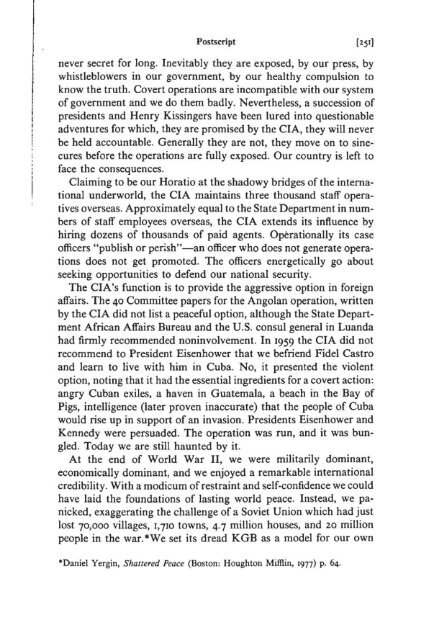In Search of Enemies - A CIA Story - John Stockwell
In Search of Enemies - A CIA Story - John Stockwell
In Search of Enemies - A CIA Story - John Stockwell
You also want an ePaper? Increase the reach of your titles
YUMPU automatically turns print PDFs into web optimized ePapers that Google loves.
Postscript<br />
never secret for long. <strong>In</strong>evitably they are exposed, by our press, by<br />
whistleblowers in our government, by our healthy compulsion to<br />
know the truth. Covert operations are incompatible with our system<br />
<strong>of</strong> government and we do them badly. Nevertheless, a succession <strong>of</strong><br />
presidents and Henry Kissingers have been lured into questionable<br />
adventures for which, they are promised by the <strong>CIA</strong>, they will never<br />
be held accountable. Generally they are not, they move on to sinecures<br />
before the operations are fully exposed. Our country is left to<br />
face the consequences.<br />
Claiming to be our Horatio at the shadowy bridges <strong>of</strong> the international<br />
underworld, the <strong>CIA</strong> maintains three thousand staff operatives<br />
overseas. Approximately equal to the State Department in numbers<br />
<strong>of</strong> staff employees overseas, the <strong>CIA</strong> extends its influence by<br />
hiring dozens <strong>of</strong> thousands <strong>of</strong> paid agents. Operationally its case<br />
<strong>of</strong>ficers "publish or perish"-an <strong>of</strong>ficer who does not generate operations<br />
does not get promoted. The <strong>of</strong>ficers energetically go about<br />
seeking opportunities to defend our national security.<br />
The <strong>CIA</strong>'s function is to provide the aggressive option in foreign<br />
affairs. The 40 Committee papers for the Angolan operation, written<br />
by the <strong>CIA</strong> did not list a peaceful option, although the State Department<br />
African Affairs Bureau and the U.S. consul general in Luanda<br />
had firmly recommended noninvolvement. <strong>In</strong> 1959 the <strong>CIA</strong> did not<br />
recommend to President Eisenhower that we befriend Fidel Castro<br />
and learn to live with him in Cuba. No, it presented the violent<br />
option, noting that it had the essential ingredients for a covert action:<br />
angry Cuban exiles, a haven in Guatemala, a beach in the Bay <strong>of</strong><br />
Pigs, intelligence (later proven inaccurate) that the people <strong>of</strong> Cuba<br />
would rise up in support <strong>of</strong> an invasion. Presidents Eisenhower and<br />
Kennedy were persuaded. The operation was run, and it was bungled.<br />
Today we are still haunted by it.<br />
At the end <strong>of</strong> World War II, we were militarily dominant,<br />
economically dominant, and we enjoyed a remarkable international<br />
credibility. With a modicum <strong>of</strong> restraint and self-confidence we could<br />
have laid the foundations <strong>of</strong> lasting world peace. <strong>In</strong>stead, we panicked,<br />
exaggerating the challenge <strong>of</strong> a Soviet Union which had just<br />
lost 70,000 villages, 1, 710 towns, 4. 7 million houses, and 20 million<br />
people in the war. *We set its dread KGB as a model for our own<br />
•Daniel Yergin, Shattered Peace (Boston: Houghton Miffiin, 1977) p. 64.


